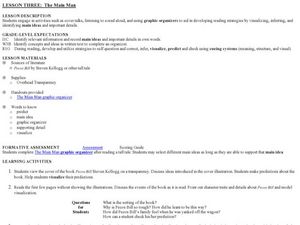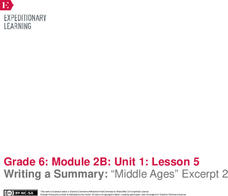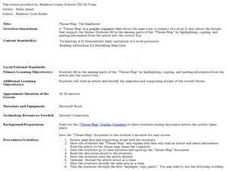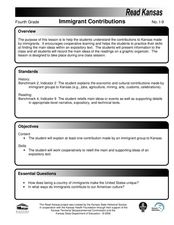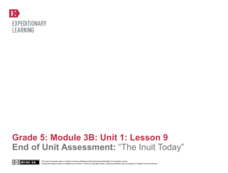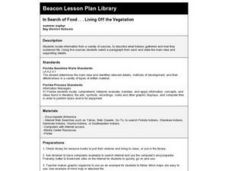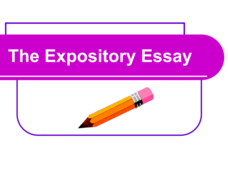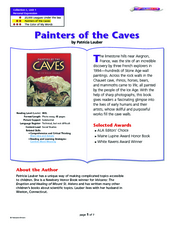EngageNY
The Five W’s
Let's take the big W. Scholars analyze the model newspaper article Sandy wreaks havoc across Northeast; at
least 11 dead and look to answer who, what, when, where, and why. They work in groups of three to complete a Five W’s web...
Curated OER
Organizing Main Ideas and Supporting Details
Students read given information and identify the main ideas and specific detail of the story. In groups, they read a historical title and create a "book talk" for each one, summarizing the story. In addition, students create a...
Curated OER
The Main Man
Students explore visualizing stories by completing a graphic organizer. In this reading strategy lesson, students read the story Pecos Bill by Steven Kellog and identify the setting, main characters and their interpretations. Students...
EngageNY
Writing a Summary: “Middle Ages” Excerpt 2
What is the big idea? Scholars use Middle Ages Excerpt 2 to complete a summary graphic organizer. They then use the information from the organizer to write a summary of the text on lined paper. Learners share summaries with the class.
EngageNY
Close Reading of Excerpts from My Librarian Is a Camel: How Do People Access Books Around the World?
Acquaint your class with informational text through a close reading. First, examine a couple of pages together, looking at text features and content. The whole class focuses on marking down a brief summary of each paragraph before...
Curated OER
From Graphic Organizer to Comparison
Fifth graders brainstorm a variety of topics for writing. As a class, learners create four types of graphic organizers on selected topics. They discuss how to use graphic organizer in constructing a written paragraph.
Curated OER
Theme Map- The Rainforest
Students use graphic organizers to relate information. They read an article and insert information from the article to the theme map using a word processing program.
Curated OER
Immigrant Contributions
Students read a passage about immigrants making contributions to the state of Kansas and write the main ideas and details of what they read. In this immigrant contributions lesson plan, students fill out a graphic organizer of immigrant...
Novelinks
The Devil’s Arithmetic: Personal Narrative Assignment
How can an unfamiliar place help you learn something about yourself? Use a narrative writing prompt as you culminate your unit on Jane Yolen's The Devil's Arithmetic. Kids consider the ways that, like the main character from the novel,...
EngageNY
Mid-Unit Assessment: Close Reading of the "Spadefoot Toad"
A mid-unit assessment challenges scholars to use their close reading skills to identify the main idea and key details. After reading a brief excerpt, learners answer a series of questions—multiple-choice, short answer—complete a graphic...
EngageNY
End of Unit Assessment: “The Inuit Today”
Then and now. Scholars complete an end of unit assessment covering The Inuit Thought of It by comparing past and modern day life for the Inuit. They complete a main idea graphic organizer, analyze key terms, and write a summary paragraph.
Literacy Design Collaborative
In Pursuit of Happiness
What ideas and philosophies guided the Transcendentalist movement in America? Scholars explore the topic, reading texts by Ralph Waldo Emerson and Henry David Thoreau. Additionally, they write essays comparing the authors' structural...
EngageNY
Identifying Author’s Opinion and Evidence: The Value of Sports in People’s Lives, Part I
Just like instant replay, it's time to take a closer look! Pupils work together to add ideas to a Close Readers Do These Things anchor chart. They then put their knowledge to the test as they read an informational article about the...
EngageNY
Building Background Knowledge About the Hero’s Journey, Part 2: Acts 2 and 3 Plus Focusing on Key Vocabulary in “The Hero’s Journey”
It's all in the details. Scholars read acts two and three of The Hero's Journey and collect important details from the text. They share their notes with their peers and listen for key words from the story. They then turn their attention...
ReadWriteThink
Captioning the Civil Rights Movement: Reading the Images, Writing the Words
Scholars boost their knowledge of the Civil Rights Movement with a lesson plan that challenges writers, readers, and historians to analyze primary sources and caption their observations. By way of reading, writing, discussion,...
Curated OER
Critical Reading Skills Worksheet
In this critical thinking worksheet, students fill out a graphic organizer about a story they read including predicting, main idea, values, and more. Students complete 5 sections in the graphic organizer.
Curated OER
In Search of Food...Living Off the Vegetation
Fourth graders locate information to describe what Indians gathered and how they sustained life. They use 5 resources, select a paragraph from each and state the main idea and supporting details.
Curated OER
Star it Chart
In this main idea worksheet, students fill out a star graphic organizer about the main idea, movement, location, place, and more for a subject. Students complete 6 spaces.
Curated OER
E chart
In this graphic organizer worksheet, students record the main idea on one line and the details to support it on three additional lines. These additional lines on the graph make an E.
jc-schools
The Expository Essay
Did you ever create an awesome graphic organizer only to find that your class was completely baffled by how to use it? This resource not only provides you with a great graphic organizer for a standard five-paragraph essay, but also...
Curated OER
Painter of the Caves
What a great lesson! Learners read a story called Painters of the Caves by Patricia Lauber which discusses Stone Age wall paintings in Avignon, France. There is a series of discussion questions, comprehension questions, and a graphic...
Curated OER
Context Helps: The Wild Foundation
In this Context Helps: The Wild Foundation worksheet, students read 7 words in context and write their own sentences, read a 2 1/2 page article about The Wild Foundation, use a graphic organizer to record the details, and rewrite the 5...
EngageNY
Building Background Knowledge: The Boy Who Invented TV, “Life before Philo”
Walk through the pictures to understand the text. Scholars analyze The Boy Who Invented TV: The Story of
Philo Farnsworth by taking a book walk and looking at the pictures. They then do a first read of Life before Philo to determine the...
Curated OER
Word Maps Teaching Ideas
In this literacy worksheet, students are given a graphic organizer to complete or are presented it as part of the lesson developed from using this sheet.




